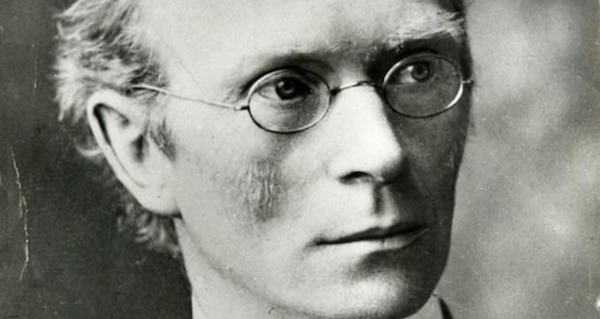
Eoin MacNeill contributed directly to the 1916 Easter Rising by establishing, arming and training the Irish Volunteers. His last-minute intervention to call off the Rising continues to fuel historical debate.
Eoin MacNeill (1867-1945) was born of middle-class Catholic parents at Glenarm on the Antrim coast. He was educated at St Malachy’s College, Belfast and gained a degree from the Royal University of Ireland. In 1893, together with Douglas Hyde and others he founded the Gaelic League, an organisation devoted to the preservation of the Irish language, literature, and traditional culture. He was the first secretary of the Gaelic League, and edited its influential journal An Claidheamh Soluis (the Sword of Light) for a period. A brilliant linguist and historian, MacNeill revolutionised Celtic studies, establishing that the sources did not extend beyond the fifth century and that accounts of earlier periods were based on late fabrications. In 1909, he became professor of early and medieval Irish history at University College, Dublin.
While primarily a scholar and cultural activist, in an article entitled ‘The North began’ in An Claidheamh Soluis (1 November 1913), McNeill advocated the formation of a national volunteer force on the lines of the Ulster Volunteer Force. The organisation was established in Dublin on
25 November, its ostensible purpose being to safeguard Home Rule; a number of the executive, however, were members of the Irish Republican Brotherhood who aimed at using the Volunteers to gain full independence, which indeed came to pass, most of the participants in the 1916 Rising being members of the Volunteers. MacNeill, also a separatist but moderate in tone and well regarded publicly, was given the role of chief of staff.
Under MacNeill’s direction recruitment proceeded apace, the numbers eventually reaching 170,000. He also encouraged the creation of a complementary women’s force, Cumann na mBan, in April 1914. As chief of staff, he was involved in planning the importation of the Howth arms. Following the split in September 1914 and the defection of the vast majority of members to Redmond, the remaining Irish Volunteers, numbering about 10,000 and mainly located in Dublin, continued under MacNeill’s leadership. Many in this new and trimmed-down force of Irish Volunteers had little regard for Home Rule, the majority being committed republicans.
MacNeill’s strategy was to organise an insurrection if there were adequate reasons and when circumstances seemed favourable; in the meantime, the Irish Volunteers should be fully armed, trained, and held in readiness to counter any attempt to disarm the organisation, impose conscription, or abandon Home Rule. Some of the IRB faction in the leadership, however, planned an insurrection for the more immediate future. It organised routine manoeuvres for Easter Sunday 1916 as a cover for an insurrection throughout the country. Learning of this on Easter Thursday, MacNeill confronted Patrick Pearse, one of the IRB ringleaders, telling him that he would not allow ‘a half-armed force to be called out’. Later, however, Pearse, Thomas MacDonagh and Sean MacDiarmada allayed his fears, informing him of the imminent landing of a German ship with substantial quantities of arms at Fenit, Co. Kerry. When it transpired on Saturday evening that the ship had sunk and the arms were lost, MacNeill countermanded the order for manoeuvres the following day.
As a result of MacNeill’s countermand, the 1916 Rising was almost entirely confined to Dublin; even there, the numbers were only about a quarter of what they might otherwise have been. The countermand probably did not materially affect the outcome: even the entire Irish Volunteers force, as it then was (10,000 men), could not have withstood the military might which would have been deployed against it.
MacNeill’s action certainly doomed the Rising to failure; on the other hand, if it were not for the countermand, the British might well have prevented the Rising from taking place, thus ensuring that there was no loss of life; once they believed that the manoeuvres were off the British became complacent and in effect allowed the Rising to go ahead.
MacNeill took no part in the Rising. Nevertheless, he was tried by court-martial and sentenced to penal servitude for life; he was released under amnesty in June 1917.
![[Irish Republican News]](https://republican-news.org/graphics/title_gifs/rn.gif)
![[Irish Republican News]](https://republican-news.org/graphics/title_gifs/harp.gif)

